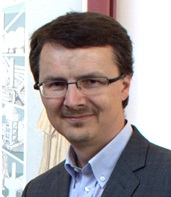|

The 6th edition of the Game and Entertainment Technologies 2013 (GET) International Conference was hosted in Prague, Czech Republic, during 22 to 24 July, 2013 and was co-organised by The University of Economics in Prague (VŠE), Czech Republic. This conference was part of the IADIS Multi Conference on Computer Science and Information Systems 2013, 22 - 26 July.
This conference aimed to bring together research and practice from creative, social and business practitioners and researchers in this challenging field. The focus of this conference was on design, development and evaluation of games, entertainment technologies and the nature of play.
 Known to have been enjoyed since at least 30 BC, games and entertainment are a universal part of human experience and present in all cultures. Games and entertainment activities contribute to the social, emotional, psychological and physical well-being of human society. As game and entertainment technologies become increasingly more pervasive we are continually challenged in our work, learning and personal life by increased access to virtual spaces and communities that offer opportunities for everyday needs and aesthetic experiences. The 'Creative Industries' require design and development structures, techniques and methodologies that enrich, enhance and encourage new interaction modes, metaphors and in-depth co-creation. Known to have been enjoyed since at least 30 BC, games and entertainment are a universal part of human experience and present in all cultures. Games and entertainment activities contribute to the social, emotional, psychological and physical well-being of human society. As game and entertainment technologies become increasingly more pervasive we are continually challenged in our work, learning and personal life by increased access to virtual spaces and communities that offer opportunities for everyday needs and aesthetic experiences. The 'Creative Industries' require design and development structures, techniques and methodologies that enrich, enhance and encourage new interaction modes, metaphors and in-depth co-creation.
The proceedings of the Game and Entertainment Technologies 2013 Conference were jointly published with the Interfaces and Human Computer Interaction 2013 Conference.
These events received 155 submissions from more than 29 countries. Each submission has been anonymously reviewed by an average of five independent reviewers, to ensure that accepted submissions were of a high standard. Consequently only 27 full papers were approved which means an acceptance rate of 17 %. A few more papers were accepted as short papers, reflection paper and posters.
An extended version of the best papers were selected to be published in the IADIS International Journal on Computer Science and Information Systems (ISSN: 1646-3692) and/or in the IADIS International Journal on WWW/Internet (ISSN: 1645-7641) and also in other selected journals, including journals from Inderscience. Some of the best papers will be eligible to be extended and enhanced as book chapters for inclusion in a book to be published by IGI Global.
Besides the presentation of full papers, short papers, reflection paper and posters, the conference also included one keynote presentation from an internationally distinguished researcher Professor Helwig Hauser, University of Bergen, Norway.
Keynote presentation
 "INTEGRATING INTERACTIVE AND COMPUTATIONAL ANALYSIS IN VISUAL ANALYTICS" "INTEGRATING INTERACTIVE AND COMPUTATIONAL ANALYSIS IN VISUAL ANALYTICS"
by Dr. Helwig Hauser
University of Bergen, Norway
Abstract
In our emerging information age it becomes increasingly important that we can exploit the wealth of available data for the sake of learning, decision making, as well as for other tasks. A promising approach – not at the least targeted by the new concept of visual analytics in visualization research – is to cleverly integrate the strengths of computers (fast computation, efficient handling of large datasets, comparably low costs, etc.) with the strengths of the users (outstanding perceptual and cognitive capabilities, domain knowledge, etc.). In this talk, we look at one possible solution, originating in visualization research within computer science, i.e., the concept of interactive visual analysis, and describe it as an iterative process, enabling the integration of computational and interactive means for data exploration and analysis. Thinking of interactive visual analysis as an iterative process enables that each step is performed on the basis of a toolbox with computational and interactive visual solutions. In order to substantiate the conceptual aspects of this solution, wealso look at several examples that document the successful application of interactive visual analysis.
The GET Conference 2013 proceedings was published in Book (ISBN: 978-972-8939-90-8) by IADIS Press.
Program Committee Members:
Abdennour El Rhalibi, Liverpool John Moores University, United Kingdom
Alessio Ceccherelli, Tor Vergata University, Italy
Alf Inge Wang, Norwegian University Of Science And Technology, Norway
Ali Arya, Carleton University, Canada
Anastasios Karakostas, Aristotle University Of Thessaloniki, Greece
Andreas Papazois, Computer Technology Institute & Press "Diophantus", Greece
Angela Tinwell, Bolton University, United Kingdom
Anthony Whitehead, Carleton University, Canada
Areti Damala, Cnam - Cedric, France
Arttu Perttula, Tampere University Of Technology, Finland
Bobby Schweizer, Georgia Institute Of Technology, Usa
Brunhild Bushoff, sagasnet, Germany
Carla Hoekendijk, Independant Consultant, Advisor Hogeschool Van Ams, Netherlands
Castulus Kolo, Macromedia University Of Applied Sciences, Germany
Christian Licoppe, Enst Department Of Social Science, France
Christos Bouras, University Of Patras And Computer Technology Insti, Greece
Clara Fernandez-Vara, Singapore-MIT GAMBIT Game Lab, USA
Connie Veugen, Vrije Universiteit Amsterdam, Netherlands
Dominic Arsenault, Université de Montréal, Canada
Elaine M. Raybourn, Sandia National Laboratories, Usa
Ellen Brox, Norut - Northen Research Institute, Norway
Eric Gressier, Cnam - Cedric, France
Erik Van Der Spek, Eindhoven University Of Technology, Netherlands
Evi Sampanikou, University Of The Aegean, Greece
Gabriele D'angelo, University Of Bologna, Italy
Gunver Majgaard, University Of Southern Denmark, Denmark
Gustavo Lyrio, Institute of Pure and Applied Mathematics - IMPA, Brazil
Gustavo Marfia, University Of Bologna, Italy
Hanna Wirman, Hong Kong Polytechnic University, Hong Kong
Harry Agius, Brunel University, United Kingdom
Ian Dixon, Sae Institute & Qantm College, Australia
Isabelle Astic, Cnam, France
J. Rogerio Santana, Instituto UFC Virtual - UFC, Brazil
Jacco Bikker, University Of Applied Science, Netherlands
James Bowman, University Of Advancing Technology, Usa
Jerome Dupire, Cnam - Cedric, France
Jesper Juul, New York University Game Center, USA
Joris Dormans, Hogeschool Van Amsterdam, Netherlands
Jose Castro-filho, Ufc-virtual, Brazil
Jouni Smed, University Of Turku, Finland
Lars Konzack, Associate Prof., Denmark
Laura Ricci, University Of Pisa, Italy
Louis-martin Guay, University Of Montreal, Canada
Luca Rossi, University Of Urbino, Italy
Magnus Johansson, Stockholm University, Sweden
Marcos Rodrigues, Sheffield Hallam University, United Kingdom
Mark Grimshaw, Aalborg University, Denmark
Markus Wiemker, Rwth Aachen, Germany
Maude Bonenfant, University Of Quebec In Montreal, Canada
Melinda Jacobs, Subatomic, Netherlands
Michael Katchabaw, University Of Western Ontario, Canada
Michel Simatic, Telecom Sudparis, France
Mikael Collan, Lappeenranta University of Technology, Finland
Niklas Ravaja, Aalto University, Finland
Pauliina Tuomi, Tampere University Of Technology, Finland
Peder Burgaard, TDC, Denmark
Pilar Lacasa, University Of Alcala, Spain
René Glas, Utrecht University, Netherlands
Roberto Beauclair Seixas, National Institute Of Pure And Applied Mathematics, Brazil
Rommert Casimir, Tilburg University, Netherlands
Ruck Thawonmas, Ritsumeikan University, Japan
Sarah Labelle, Université Paris XIII, France
Sophie Chabridon, Télécom Sudparis, France
Spyros Vosinakis, University Of The Aegean, Greece
Stefano Ferretti, University Of Bologna, Italy
Steven Harris, Anglia Ruskin University, United Kingdom
Thrasyvoulos Tsiatsos, Aristotle Univerisity of Thessaloniki, Greece
Timo Lainema, Turku School Of Economics, Finland
Vagelis Kapoulas, Computer Technology Institute & Press "diophantus", Greece
Yoshihiro Okada, Kyushu University, Japan
|

 Known to have been enjoyed since at least 30 BC, games and entertainment are a universal part of human experience and present in all cultures. Games and entertainment activities contribute to the social, emotional, psychological and physical well-being of human society. As game and entertainment technologies become increasingly more pervasive we are continually challenged in our work, learning and personal life by increased access to virtual spaces and communities that offer opportunities for everyday needs and aesthetic experiences. The 'Creative Industries' require design and development structures, techniques and methodologies that enrich, enhance and encourage new interaction modes, metaphors and in-depth co-creation.
Known to have been enjoyed since at least 30 BC, games and entertainment are a universal part of human experience and present in all cultures. Games and entertainment activities contribute to the social, emotional, psychological and physical well-being of human society. As game and entertainment technologies become increasingly more pervasive we are continually challenged in our work, learning and personal life by increased access to virtual spaces and communities that offer opportunities for everyday needs and aesthetic experiences. The 'Creative Industries' require design and development structures, techniques and methodologies that enrich, enhance and encourage new interaction modes, metaphors and in-depth co-creation. "INTEGRATING INTERACTIVE AND COMPUTATIONAL ANALYSIS IN VISUAL ANALYTICS"
"INTEGRATING INTERACTIVE AND COMPUTATIONAL ANALYSIS IN VISUAL ANALYTICS"